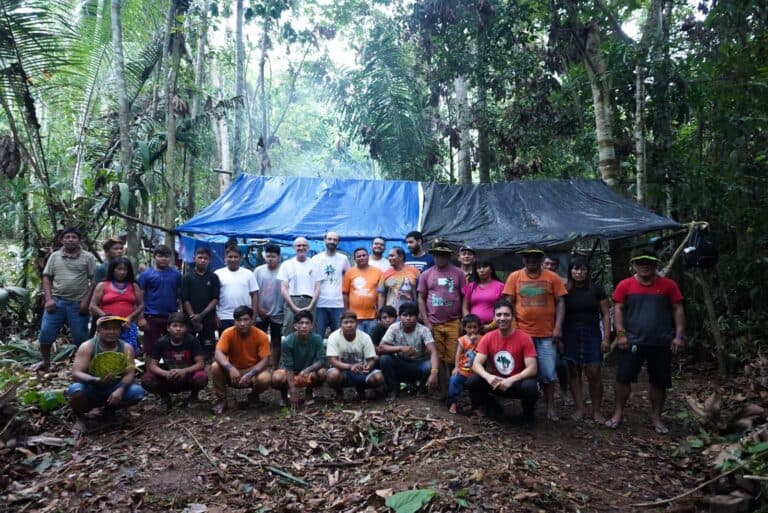SÃO PAULO – A Church committee in Brazil says the territory of the Ka’apor Indigenous people, which concentrates 25 percent of the remaining area of rainforest in the Amazonian state of Maranhão, is currently endangered by illegal loggers and poachers.
They are being used by mining companies interested in exploiting the region, and by carbon credit agencies, the committee said after visiting the land in December.
The mission was led by the Bishops’ Conference’s Integral Ecology and Mining Commission, a group inspired by Pope Francis’s encyclical Laudato si’ and established in 2019. Leaders of the Ka’apor had told members of the commission about their problems and requested their assistance.
The group was formed by Bishop Gabriele Marchesi of the Diocese of Floresta, who is part of the Integral Ecology commission, by Father Dario Bossi, one of the commission’s advisors, by the local priest Father Paulo Ricardo Marques, and by lay members of Catholic pastoral ministries who work with peasants and Indigenous populations.
“Their situation is quite serious. Their territory is being targeted by mining companies. They suspect they have been exploring some areas,” Bossi told Crux.
At the same time, illegal loggers have been acting in the region for years, and no real punishment has ever been applied to them, he added.
According to Gilderlan Rodríguez, a local coordinator of the Bishops’ Conference’s Indigenous Missionary Council (CIMI), the animals in the territory killed by illegal hunters are sold to restaurants in the nearby cities.
“At the same time, the mining problem has been growing. In the past, only artisanal miners operated in the area. Now, large companies are eyeing the Ka’apor territory,” Rodríguez told Crux.
At the beginning of the 20th century, the Ka’apor were considered to be one of the most hostile Indigenous peoples in Brazil and the government faced several difficulties in its efforts to “pacify” them, which was that time’s policy for the native populations.
In 1975, their group had been reduced to only 500 individuals, after decades of persecution and violence. In 1982, their territory was finally granted to them by the government. Now, there are around 1,800 members of the Ka’apor nation.
Over the past decade, they have been facing a number of challenges. In 2013, illegal loggers invaded their village and attacked women and children. The Brazilian government failed to provide concrete assistance to them, and they decided to break up with the National Indigenous Foundation (FUNAI), the state agency that protects the native populations.
Since then, the Ka’apor founded their own schools – in which classes prioritize their native language and not Portuguese – and their self-defense group.
“They came up with the idea of creating itinerant communities in areas coveted by invaders as a way to prevent their lands from being stolen. They have already established 12 of such villages,” Bossi said.
That strategy has been working in reducing the invasions. According to Rodríguez, the Ka’apor were able to take over an area that had been occupied by loggers.
“But that resulted in several threats over the past months. As they protect their lands, they impede several illegal economic activities from happening and impacting the whole region,” he said.
Since 2016, four Ka’apor leaders have been murdered as they struggled for their territory. A fifth leader, the late Cacique Sarapó, died in suspicious circumstances and many Ka’apor believe he was poisoned. Seven other leaders are facing legal consequences because of their struggle.
“That’s a region of powerful farmers – and powerful interests as well,” Rodríguez said.
Bossi said that carbon credit companies have been asking permission to operate in the Ka’apor territory by “reprehensible” methods.
“They have been trying to manipulate some of the villagers, including people who can’t even speak Portuguese. The so-called green economy at times works to divide the communities,” the priest said.
According to Bishop Vicente Ferreira of the diocese of Livramento de Nossa Senhora, who leads the commission, the group is now focusing on spreading the report among Church organizations and civic movements.
“We will also take it to the authorities,” he told Crux.
Bossi said that the commission is recommending that FUNAI and the Ka’apor caciques’ council re-establish their dialogue.
“That movement is needed in order to resume policies for healthcare, for education, and for the monitoring and control of the territory,” he explained.
The Church will keep accompanying the Ka’apor and helping them struggle for their rights, Bossi told Crux.















